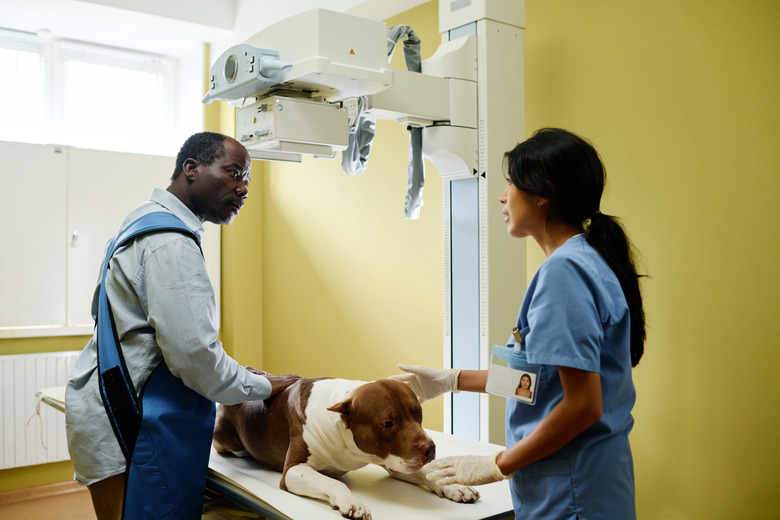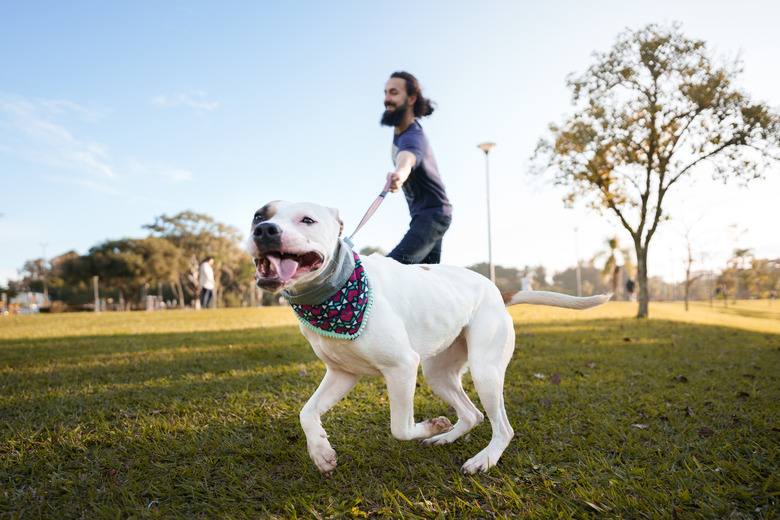Side Effects Of Using Proin In Dogs
Proin, the short name for phenylpropanolamine (often abbreviated as PPA), is a common drug that veterinarians prescribe for dogs dealing with urinary incontinence issues. Even though it's quite effective, Proin may cause side effects in some dogs.
Urinary incontinence in dogs
Urinary incontinence in dogs
Urinary incontinence, or the involuntary leaking of urine, is fairly common in dogs. Although it can happen at any age, it is most common in middle- to senior-aged dogs and female dogs. It is estimated that urethral incontinence may affect over 20 percent of all spayed female dogs, especially large-breed dogs.
There are many causes for loss of bladder control, including hormonal imbalance, protruding intervertebral disks, chronic inflammatory disease, urinary tract infections, spinal trauma, urinary stones, birth defects, prostate disorders, and anatomic disorder, among others.
If your dog has incontinence issues caused by things like like crystals/stones and frequent UTIs, certain diets may provide an alternative to drugs like Proin. Dog diapers can also provide a temporary solution for dogs suffering from urinary incontinence in the home, though prescription drugs like Proin can provide a longer-lasting solution.
What is Proin for dogs?
What is Proin for dogs?
Proin is a widely used drug that veterinarians prescribe to treat urinary incontinence in dogs. It works by strengthening the sphincter tone of the urethra, which often weakens as the dog ages.
Proin was originally administered as a tablet that needed to be given two to three times a day. This created challenges for owners who might not be able to give their dog medicine multiple times a day due to long work hours or an erratic schedule. However, in 2019, the FDA approved an extended-release version of Proin that can be dosed once daily.
Proin side effects in humans
Proin side effects in humans
Proin was available some years ago as a medication for humans under the name of phenylpropanolamine. This was used as an appetite suppressant but was pulled from the market in 2005 because it was suspected of increasing the chances of stroke and cerebral hemorrhage. However, these Proin side effects have not been observed when giving Proin for dogs.
Proin side effects in dogs
Proin side effects in dogs
While Proin can be tremendously effective in dealing with urinary incontinence, it's important to be aware of the possible side effects. The most common Proin side effects in dogs are diarrhea, vomiting, loss of appetite, weight loss, irritability, restlessness, agitation, vocalization, difficulty urinating, increased thirst, increased water intake, and lethargy.
While less common, some dogs taking Proin may suffer from more serious side effects. These can include tremors, seizures, collapse, loss of coordination, elevated liver enzymes, blood in the urine, or even kidney failure. There is also some evidence that long-term use of Proin may be associated with myocardial hypertrophy, a thickening of the heart muscles.
Dogs with certain drug sensitivities may find Proin triggers an allergic reaction with symptoms such as hives, facial swelling (lips, tongue), and breathing difficulties. Because Proin stimulates the release of the stress hormone norepinephrine, its use may also elicit a 'flight or flight response.
Reporting Proin side effects
Reporting Proin side effects
When beginning a course of Proin, it's important to report any side effects to the prescribing veterinarian. Dogs who cannot tolerate Proin may do better on another medicine, such as Incurin. While Proin can be an effective treatment, it is not a cure; if use of Proin is halted, it is likely that the sphincter muscles will weaken again, and the symptoms of urinary incontinence will return.
Other considerations when using Proin for dogs
Other considerations when using Proin for dogs
While Proin can be an effective treatment for dogs battling urinary incontinence, it should be used with caution in those with an overactive thyroid, diabetes, glaucoma, high blood pressure, or heart disease. The drug may also interact negatively with ephedrine, aspirin, and tricyclic antidepressants.
Side effects of Proin can result from interactions with even natural dietary additions, so veterinarians should be made aware of any medications, supplements, or vitamins that the dog is taking in order to avoid potentially dangerous reactions.


